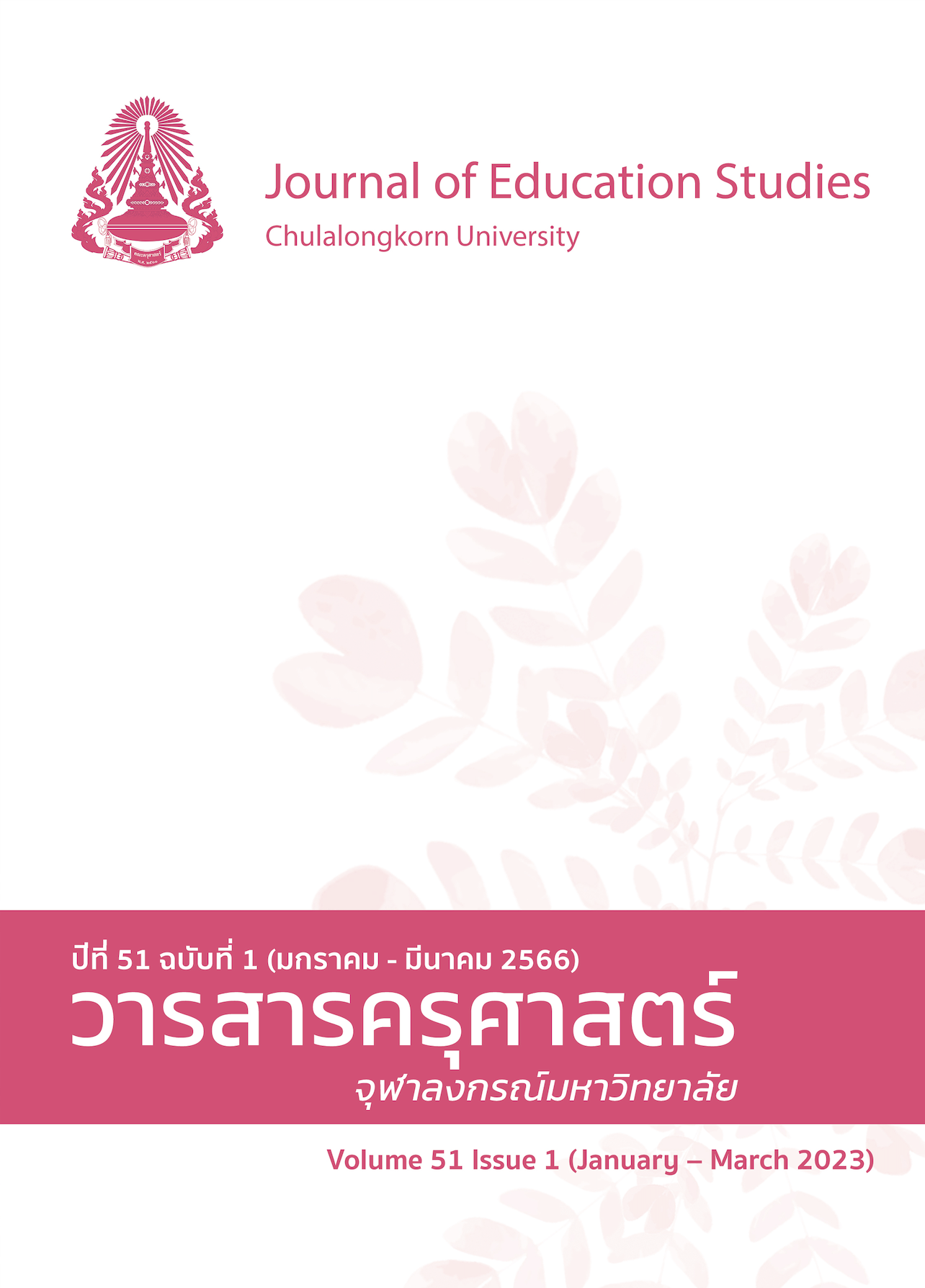Educational Futurology Tools to Promote Lifelong Learning Skills of Next Citizens in the Next Normal Era
DOI:
https://doi.org/10.14456/educu.2023.3Keywords:
educational futurology, lifelong learning skills, NEXT citizensAbstract
Educational futurology is a transdisciplinary science related to the provision of teaching and learning to prepare citizens for future human livelihoods relevant to all contexts in the modern world. Future-oriented education is essential for all teachers because it helps everyone learn how to live in a complex and rapidly changing society, helps students develop a futuristic perspective, and enables students to rationally deal with the uncertainties of the future. This article highlights the capacity of NEXT citizenship to promote lifelong learning skills, including inclusiveness, informedness, engagement, balance, empowerment, and alertness. These capabilities should be included in the tools for strengthening NEXT citizenship. The presentation of tools for harnessing next-generation citizenship in this paper refers to the tools for future science education in the development of massive open online course systems (MOOCs) to promote lifelong learning skills in the 21st century. It is a combination of modern technology and teaching methods through online channels emphasizing accessibility with free or low-cost internet services as a future tool for lifelong learning for NEXT citizens in the next normal life era.
References
รายการอ้างอิง
ภาษาไทย
ชรินทร์ มั่งคั่ง. (2565). การสอนอนาคตวิทยาสำหรับครูสังคมศึกษา (พิมพ์ครั้งที่1). ลานนาการพิมพ์.
ภาษาอังกฤษ
Agarwal, A. (2015, April 22). Reimagine freshman year with the global freshman academy. edX Blog. http://blog.edx.org/reimagine-freshman-year-global-freshman/
Allen, I., Seaman, J., Poulin, R., & Straut, T. T. (2016). Online report card: Tracking online learning in the United States. Babson Survey Research Group. http://onlinelearningsurvey.com/reports/onlinereportcard.pdf [Google Scholar]
Biggs, J. (2003). Teaching for quality learning at university (2nd ed, Vol. 1). Open University Press.
Bonk, C. J., Lee, M. M., Reeves, T. C., & Reynolds, T. H. (2015). MOOCs and open education around the world. Routledge.
Conole, G. (2015). Designing effective MOOCs. Educational Media International, 52(4), 239–252. https://doi.org/10.1080/09523987.2015.1125989
Creelman, A., Ehlers, U., & Ossiannilsson, E. (2014). Perspectives on MOOC quality-An account of the EFQUEL MOOC Quality Project. International Journal for Innovation and Quality in Learning, 2(3), 78–87.
Davidson, S. (2017). Futurology in the College Classroom. InSight: A Journal of Scholarly Teaching, 1(13), 51-52.
Downes, S. (2015). The quality of massive open online courses. International Handbook of E-Learning, 1, 93–106. Routledge. https://doi.org/10.4324/9781315760933-12
Gamage, D., Fernando, S., & Perera, I. (2015, August). Quality of MOOCs: A review of literature on effectiveness and quality aspects. In 2015 8th International Conference on Ubi-Media Computing (UMEDIA) (pp. 224–229). IEEE. https://doi.org/10.1109/UMEDIA.2015.7297459
Hew, K. (2016). Promoting engagement in online courses: What strategies can we learn from three highly rated MOOCS?. British Journal of Educational Technology, 47(2), 320–341. https://doi.org/10.1111/bjet.12235.
Fingal, J. (2019). The 5 competencies of digital citizenship. International Society for Technology in Education. https://www.iste.org/explore/digitalcitizenship/5-competenciesdigital-citizenship.
Kizilcec, R. F., & Schneider, E. (2015). Motivation as a lens to understand online learners: Toward data driven design with the OLEI scale. ACM Transactions on Computer-Human Interaction (TOCHI), 22(2), 1–24. https://doi.org/10.1145/2699735
Margaryan, A., Bianco, M., & Littlejohn, A. (2015). Instructional quality of massive open online courses (MOOCs). Computers & Education, 80(1), 77–83. https://doi.org/10.1016/j.compedu.2014.08.005
Nagashima, T. (2014). What makes open education thrive? Examination of factors contributing to the success of open education initiatives. INNOQUAL-International Journal for Innovation and Quality in Learning, 2(3), 10–21.
Rai, L., & Chunrao, D. (2016). Influencing factors of success and failure in MOOC and general analysis of learner behavior. International Journal of Information and Education Technology, 6(4), 262. https://doi.org/10.7763/IJIET.2016.V6.697
Rosewell, J., & Jansen, D. (2014). The OpenupEd quality label: benchmarks for MOOCs INNOQUAL. The International Journal for Innovation and Quality in Learning, 2(3), 88–100.
Saltzman, G. M. (2014). The economics of MOOCs. The NEA Almanac of Higher Education. http://whp-template.nea.org/assets/docs/HE/2014_Almanac_Saltzman.pdf
Schmidt, D., Ramot, R., & Topaz, B. (2022). Shaping the future of distance learning in teacher education: MOOCS during COVID-19. Perspectives in Education, 40(1), 250-267. http://dx.doi.org/10.18820/2519593X/pie.v40.i1.15.
Shah, D. (2019). Year of MOOC-based degrees: A review of MOOC stats and trends in 2018 (Report). Class Central. https://www.class-central.com/report/moocs-stats-and-trends-2018/
Stacey, P. (2014). Pedagogy of MOOCs. INNOQUAL - International Journal for Innovation and Quality in Learning, 2(3), 111–115.
Walker, L., & Loch, B. (2014). Academics’ perceptions on the quality of MOOCs: An empirical study. INNOQUAL-International Journal for Innovation and Quality in Learning, 2(3), 53–63.
Wu, B. (2021). Influence of MOOC learners’ discussion forum social interactions on online reviews of MOOC. Education and Information Technologies, 3483-3485. https://doi.org/10.1007/s10639-020-10412-z
Yang, M., Shao, Z., Liu, Q., & Liu, C. (2017). Understanding the quality factors that influence the continuance intention of students toward participation in MOOCs. Educational Technology Research and Development, 65(5), 1195–1214. https://doi.org/10.1007/s11423-017-9513-6
Yepes-Baldó, M., Romeo, M., Martín, C., García, M. Á., Monzó, G., & Besolí, A. (2016). Quality indicators: Developing “MOOCs” in the European higher education area. Educational Media International, 53(3), 184–197. https://doi.org/10.1080/09523987.2016.1236998
Downloads
Published
How to Cite
Issue
Section
License

This work is licensed under a Creative Commons Attribution-NonCommercial-NoDerivatives 4.0 International License.




